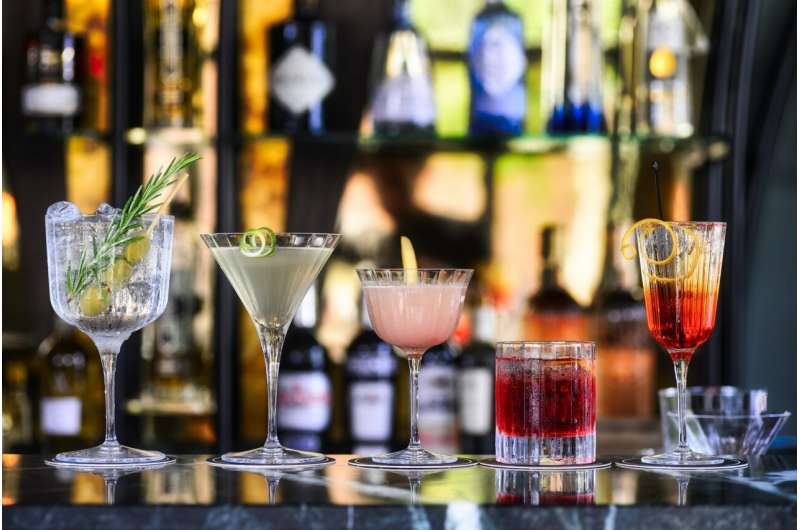This article has been reviewed according to Science X's editorial process and policies. Editors have highlighted the following attributes while ensuring the content's credibility:
fact-checked
peer-reviewed publication
trusted source
proofread
Mocktails or cocktails? Having a sense of purpose in life can keep binge drinking at bay

Heavy alcohol use is common among college students—and as a consequence, it puts young adults at risk for a wide range of health issues, from cardiovascular disease to cancer. Day in and day out, college students are bombarded with cues to drink, whether that's seeing a group of friends toast at a party or celebrating after an exam.
Using functional MRI (fMRI) scanning technology, researchers from the University of Pennsylvania, Columbia University, and Dartmouth College examined the relationship between these cues, alcohol craving, and alcohol consumption. They found that having a strong sense of purpose in life decreases the temptation to consume alcohol to excess among some social drinkers.
The study, published in Addiction, is titled "Purpose in life, neural alcohol cue reactivity and daily alcohol use in social drinkers."
Why purpose in life?
Lead author Yoona Kang, a research director of the Communication Neuroscience Lab at the Penn's Annenberg School for Communication, is deeply interested in the impact of purpose in life on health.
Her previous research has found that having a strong life purpose—the sense that your life is guided by personally meaningful values and goals—is associated with many health benefits, including easing the loneliness of COVID-19 isolation and reducing the effort it takes to make healthy choices.
"Values and purposes can have powerful effects on how people think and behave," Kang says. "And what's interesting about this study is that we asked participants, 'How much sense of purpose in life do you feel right now?' Because your level of purpose can fluctuate day by day."
Craving alcohol
For this study, Kang and colleagues charted the behavior and attitudes of 54 healthy college students, with daily surveys over the course of a month. Once a day, participants answered questions about their current level of purpose in life—and every morning and evening they reported how much they craved and consumed alcohol.
"We focused on craving because it is one of the strongest predictors of actual drinking. If you crave, then you're more likely to drink," Kang says. "But just because you crave alcohol doesn't mean that you're going to go out and drink, so we wanted to know what's nudging these social drinkers into drinking when they crave alcohol."
The student volunteers also received fMRI brain scans, which gave a real-time picture of their brain activity while they were exposed to alcohol cues, like photos of beer, wine, and liquor or photos of people toasting at a party. Researchers analyzed the participants' brain activity within the ventral striatum, the area of the brain previously associated with reward and craving.
Individuals whose brains showed greater activity when they saw alcohol cues—people with higher neural alcohol cue reactivity—were more likely to drink after craving alcohol.
When this data was matched with life purpose data, Kang and colleagues found something interesting: These neurally sensitive drinkers did not necessarily drink more if they were feeling a strong life purpose when they craved alcohol. And if they felt less purposeful? They were more likely to drink heavily after a craving for alcohol.
Further implications
This finding opens the door to discovering new strategies to discourage binge drinking in college students, especially those with higher neural cue reactivity, not by talking about drinking specifically, but by helping students focus on their mission, purpose, and values. Kang suggests that future research could test interventions used in other purposes in life and related studies—strategies like reflecting on what matters to you or making positive wishes for other people.
While the researchers caution that further testing would be needed to determine whether the findings would generalize to non-college populations, they note that many studies point to the strong link between purpose in life and health behavior across diverse populations.
And Kang underlines the importance of studying college populations. "College students are in a formative time in their lives where they are learning the norms around alcohol use and setting their own habits that will affect their health later in life," she says. "So, I think there's a lot of preventive values in studying alcohol use in college populations."
In addition to Kang, authors include Emily Falk, Danielle Cosme, David Lydon-Staley, Jeesung Ahn, Mia Jovanova, Dani S. Bassett, Silicia Lomax, Faustine Corbani (Columbia University), Ovidia Stanoi (Columbia University), Kevin Ochsner (Columbia University), Victor Strecher (University of Michigan), and Peter J. Mucha (Dartmouth College).
More information: Yoona Kang et al, Purpose in life, neural alcohol cue reactivity and daily alcohol use in social drinkers, Addiction (2022). DOI: 10.1111/add.16012




















